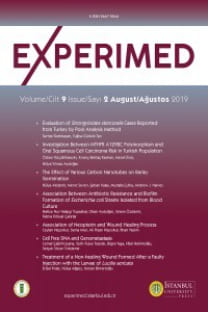Mezuniyet Öncesi Tıp Eğitiminde Elektronik Öğrenme
Video temelli öğrenme, metin temelli öğrenme, tıp eğitim, doğru yanıt oranı
Electronic Learning in Undergraduate Medical Education
Video-based learning text -based learning, succsess, medical education, correct response rate,
___
- 1. Sobral Dejano T. What kind of motivation drives medical students' learning quests? Med Educ 2004; 38: 950-7. [CrossRef] google scholar
- 2. Bedford TA. Learning Styles: A Review of Literature (1st draft). In: Toowoomba, Australia: OPACS, The University of Southern Que-ensland; 2006. google scholar
- 3. Barbe, Walter Burke; Swassing, Raymond H.; Milone, Michael N. Teaching through modality strengths: concepts practices. Colum-bus, Ohio: Zaner-Bloser; 1979.p. 117. google scholar
- 4. Keefe JW. Learning Style: An overview, in JW Keefe (ed.) Student learning styles: Diagnosing and prescribing programs, NASSP; 1979.p.11-7. google scholar
- 5. Dunn, Rita Stafford; Dunn, Kenneth J. Teaching students through their individual learning styles: a practical approach. Reston, VA: Reston Pub. Co; 1978.p.431. google scholar
- 6. Schwerdtfeger K, Wand S, Schmid O, Roessler M, Quintel M, Leiss-ner KB, et al. A prospective, blinded evaluation of a video-assisted '4-stage approach' during undergraduate student practical skills training. BMC Medical Education 2014; 14: 104. [CrossRef] google scholar
- 7. Greenhalgh T. Computer assisted learning in undergraduate me-dical education. BMJ 2001; 322: 40-4. [CrossRef] google scholar
- 8. Alick BE. Case studies of the effect of learning styles, problem-sol-ving strategies and instructional strategies on the achievement of African American college students in general chemistry (Afri-can-American). Diss Abstr Int 1993; 54/06: A2108. google scholar
- 9. Boydak AL. Learning Styles. Istanbul, Turkey: White; 2001.p.8-10. google scholar
- 10. Brown B. Myths and Realities No. 26: Teaching Style vs. Learning Style. Columbus, OH: Educational Resources Information Center 2003. google scholar
- 11. Murphy RJ, Gray SA, Straja SR, Bogert MC. Student learning prefe-rences and teaching implications. J Dental Educ 2004; 68: 859-66. [CrossRef] google scholar
- 12. Zhang S. Students' Perceptions of Multimedia Classrooms at East Tennessee State University.(dissertation).Johnson City, TN: East Tennessee State Univ; 2002.p.721. google scholar
- 13. Fulton JF. History of medical education. Br Med J 1953; 2: 457-61. [CrossRef] google scholar
- 14. Bonwell CC, Eison JA. Active Learning: Creating Excitement in the Classroom. Washington, DC: George Washington Univ; 1991.p.121. google scholar
- 15. Lujan HL, DiCarlo SE. First-year medical students prefer multiple learning styles. Adv Physiol Educ 2006; 30: 13-6. [CrossRef] google scholar
- 16. Lujan LH, Dicarlo SE. Too much teaching, not enough learning: what is the solution? Adv Physiol Educ 2006, 30: 17-22. [CrossRef] google scholar
- 17. Fleming ND. Teaching and learning styles: VARK strategies. New Zeland; 2001.p.128. google scholar
- 18. Kharb P, Samanta PP, Jindal M, Singh V. The learning styles and the preferred teaching-learning strategies of first year medical stu-dents. J Clin Diagn Res 2013; 7: 1089-92. [CrossRef] google scholar
- 19. Fleming N, Baume D. Learning Styles Again: VARKing up the right tree! Educational Developments, SEDA Ltd; 2006; 7: 4-7. [CrossRef] google scholar
- 20. Baykan Z, Naçar M. Learning styles of first-year medical students attending Erciyes University in Kayseri, Turkey, Advances in Physi-ology Education Published 1 Vol. 2007; 31: 158-60. [CrossRef] google scholar
- 21. Slater JA, Lujan HL, DiCarlo SE. Does gender influence learning style preferences of first-year medical students? Adv Physiol Educ 2007; 31: 336-42. [CrossRef] google scholar
- 22. Rezaeinejad M, Azizifar A, Gowhary H. Procedia - Social and Beha-vioral Sciences 2015; 199: 218-24. [CrossRef] google scholar
- 23. Whillier S, Lystad RP, Abi-Arrage D, McPhie C, Johnston S, Williams C, et al. The learning style preferences of chiropractic students: A cross-sectional study. J Chiropr Educ 2014; 28: 21-7. [CrossRef] google scholar
- 24. Laxman Khanal, Sandip Shah, Sarun Koirala. Exploration of prefer-red learning styles in medical education using VARK modal. Russi-an Open Medical Journal 2014; 3: 0305. [CrossRef] google scholar
- 25. Samarakoon L, Fernando T, Rodrigo C. Learning styles and approa-ches to learning among medical undergraduates and postgradu-ates. BMC Med Educ 2013; 25:13-42. [CrossRef] google scholar
- Yayın Aralığı: Yılda 3 Sayı
- Başlangıç: 2011
- Yayıncı: İstanbul Üniversitesi
Endojen Opioidlerin Ağrı Mekanizması Üzerine Etkileri
Derya CANSIZ, Ebru EMEKLİ ALTURFAN, Ata ALTURFAN
Mezuniyet Öncesi Tıp Eğitiminde Elektronik Öğrenme
Beyza ÖZÇINAR, Aykhan ABBASOV, Alper OZTURK, Firat TUTAL, Leyla TURKER SENER, Nihat AKSAKAL, Melih KARA, Özgür ALBUZ, Yesim ERBİL
Zerrin KARAASLAN, Ece AKBAYIR, Elif ŞANLI, Melis ŞEN, Recai TÜRKOĞLU, Cem İsmail KÜÇÜKALİ, Erdem TÜZÜN
Doğal Yaşlanma Modelinde Egzersiz ve Kalori Kısıtlamasının Beyin ve Testiste Etkileri
Umay HAKGÜDER, Ünsal Veli ÜSTÜNDAĞ, Burçin Alev TÜZÜNER, Nevin GENÇ, Hazal İPEKÇİ, Reyhan ÖZÇELİK, Tuğba TUNALI-AKBAY, Göksel ŞENER, Ayşen YARAT, Ebru EMEKLİ ALTURFAN
Onur ERTİK, Ozlem SACAN, Levent KABASAKAL, Göksel ŞENER, Refiye YANARDAĞ
İmplant Yüzey Özelliği Seçimi Adherent Hücrelerin Canlılığını Etkileyebilir
Gül İpek GÜNDOĞAN, Tayfun CIVAK, Cenk KIĞ
MMP9 Geninin Aort Diseksiyonundaki Olası Etkilerinin Araştırılması
Burcu SALMAN YAYLAZ, Melda SARIMAN, Ahmet EKMEKÇİ, Emel ERGÜL, Mahmut ULUGANYAN, Fulya COŞAN, Özgün Melike TOTUK GEDAR, Neslihan ABACI
Yetişkin Nörogenez ve Nörodejeneratif Hastalıklarda Büyüme Faktörlerinin Rolü
